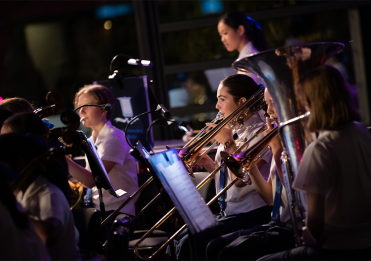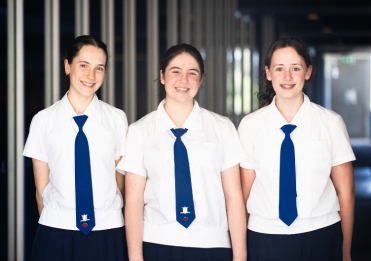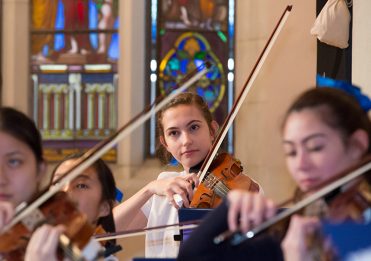Meeting our 2023 Year 7 Instrumental Music students
On Friday and Saturday, the Instrumental Music Department started meeting the 2023 cohort of Year 7 Instrumental Music students. These students come to us from scores of primary schools both within Australia and internationally. They have a wide variety of musical backgrounds, abilities, and talents. We enjoy spending time with each of them to help determine the best place for them within our ensemble and lesson structure. We take the opportunity to discuss their musical interests, what they would like to achieve in their time at BGGS, and how they can contribute to their own musical learning when they join us next year.
It is very exciting for us, as staff, to meet the new students and start to plan their progress through the curriculum and performance opportunities at our School. It is also very comforting for the young students, who may be a little nervous or apprehensive, to discover the friendly faces of the staff and current Instrumental Music students. Meeting many of the people, with whom they will be spending much of their creative time, can help create a sense of familiarity before they officially start their first year at BGGS.
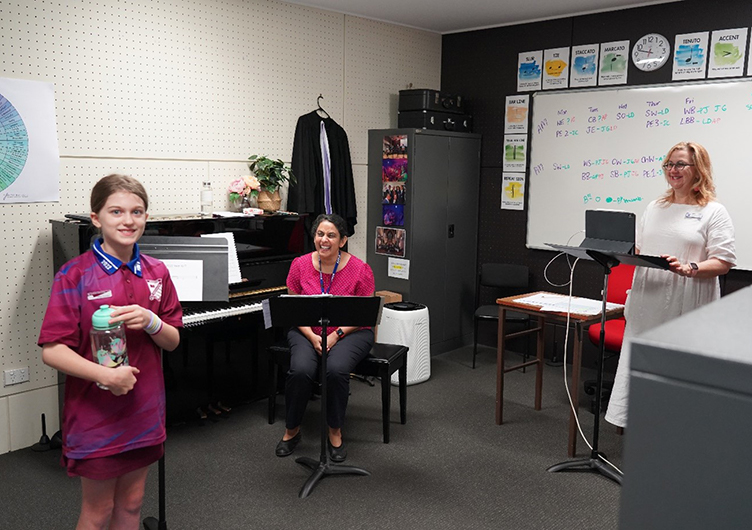
Joanne Catt having a great time with Mrs Ruani Dias-Jayasinha and Mrs Wendy Rolls
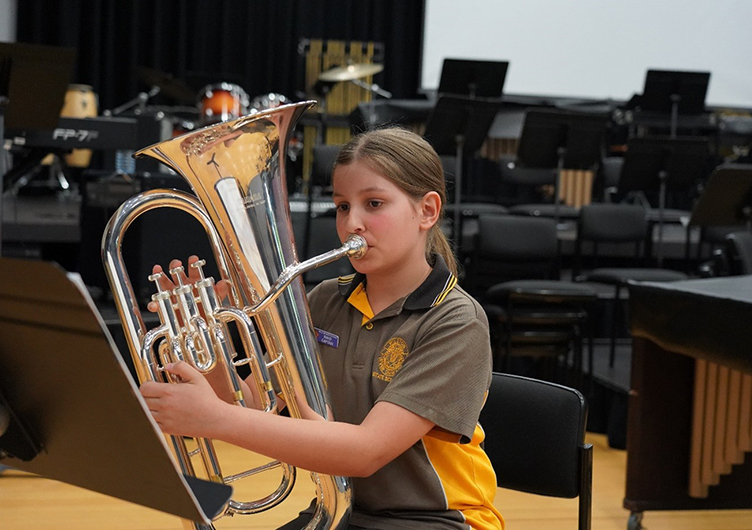
Lucia Granger concentrating very hard on her Band audition for BGGS
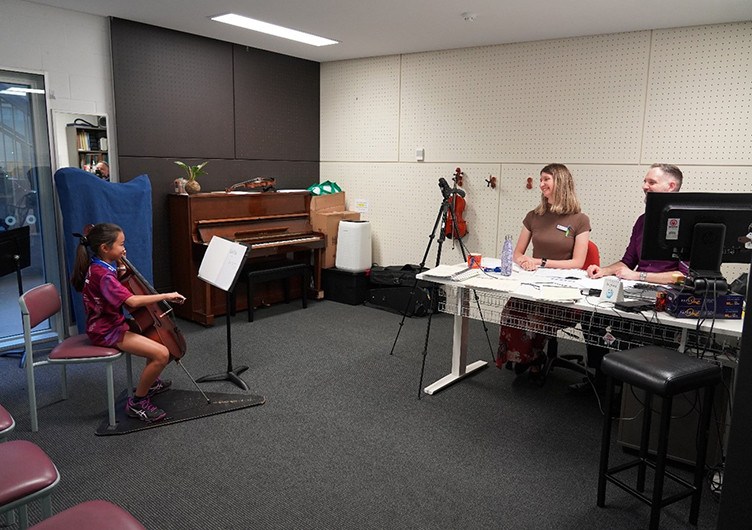
Samira Wilke playing for Ms Tiffany Duncan and Mr Jonathan Zorzetto
Joint Duxes of 2022
At last week’s Assembly, the 2022 academic prizes were announced. The joint BGGS Duxes are Holly Eddington (12B) and Caizha Lee (12M). Both students have been involved in Instrumental Music throughout their entire schooling at BGGS and we wanted to take an opportunity to speak with the girls to better understand what it is that drives them, how music played a part in their School lives, and how they successfully balanced their involvement in Instrumental Music with their academic pursuits.
We have so much admiration for both Holly and Caizha—we are immensely proud of their achievements and wish them every success for their bright futures.
In addition to Holly and Caizha’s outstanding achievements, last year’s Dux, Samantha Atherton (2021), recorded a brief video for us about her experience in Instrumental Music throughout her schooling at BGGS, and how she encourages everyone, particularly new students to our School, to participate and find your place in Instrumental Music at Grammar. As you will discover from our wonderful students, balancing Co-curricular participation with academic pursuits is not only possible … it can help you thrive!
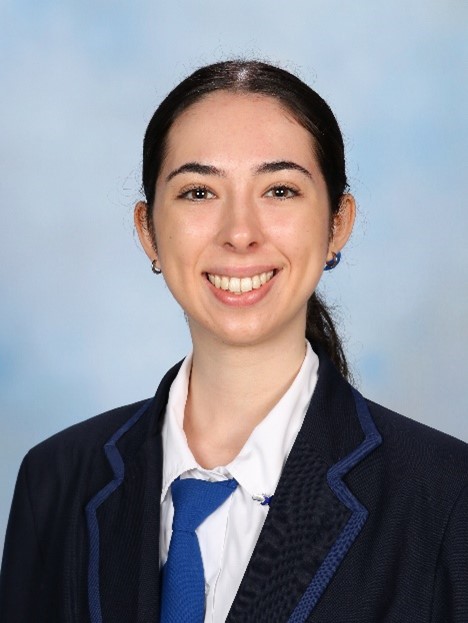
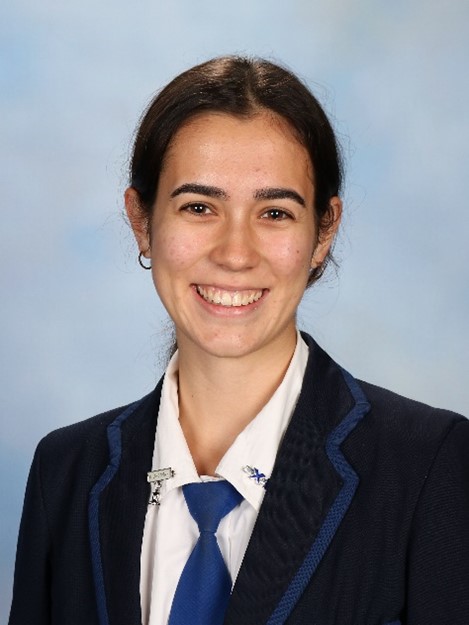
As you approach the end of your final year at BGGS, what is your single favourite memory you will take with you beyond school regarding your time in Instrumental Music?
Holly—‘I would say my single favourite memory with Instrumental Music was my time spent playing in Symphony Orchestra. I truly don’t think the talent of the girls in that group can be found anywhere else, and to have the opportunity to play in a group of that magnitude and variety of instruments was a very special and unique experience. Also, the selection of music we got to play was incredible—some of my favourites were Dance Macabre, Spartacus Adagio, and The Marriage of Figaro.’
Caizha—‘This is an embarrassing memory—in Year 7, I used to complain about the weight of my saxophone case, so my dad bought me a ‘granny’ shopping trolley, strapped my saxophone onto it, and made me wheel it through the School. I was so embarrassed about using this ‘granny’ trolley that I never complained about my heavy saxophone again.’
Some students may benefit from knowing how you managed to balance your academic pursuits with your musical interests. How did you achieve this balance, and did you find that your academic and music studies complemented each other?
Holly—‘Finding a balance between academics and music at times was definitely difficult, especially when we reached the ends of terms with lots of assessment to cope with. I found that often, practising my instrument provided a much-needed break from study. It didn’t necessarily have to be playing the hardest piece in the book or learning something new and tedious, but taking a few minutes when stressed to let myself relax by playing familiar pieces felt as though it both relaxed, and almost ‘calibrated’ my mind to start learning again! Also, as you approach senior years, the Music staff are very understanding of the stress and workload students experience, which was much appreciated and helped with the ‘practice guilt’ when there just aren’t enough hours in the day.’
Caizha—‘I saw band rehearsals and lessons as an opportunity to have a productive break from my studies. This year, I was more relaxed with my commitment to practice as I needed to prioritise homework. I practised more, often during lunch breaks, in the lead-up to performance weeks. Ms Davidson was flexible with lesson times which meant I could reschedule lessons if I didn’t want to miss out on learning important content during a certain class. I also found that a morning band rehearsal before an exam was beneficial as it took my mind off the impending exam and settled my nerves.’
When you look back at your time in Instrumental Music at BGGS, what do you think would be the most pivotal/poignant moment for you? For example, it might be something you achieved, something a teacher said to you, or an experience.
Holly—‘One of the most poignant moments from my Grammar Music experience was when Mendelssohn strings played Merry Go Round of Life from the movie Howl’s Moving Castle. I suggested this song to our conductor, Mr Zorzetto, as it is one of my all-time favourite pieces of music. To be able to play it with the group felt super special, and it felt great to know that the Music teachers truly listen to, and value, our contributions.’
Caizha—‘Joining a Jazz Band in Year 10 was a pivotal moment for me because it exposed me to more styles of music and encouraged me to really appreciate the instrumental aspect of more modern-day songs that I otherwise used to overlook. I also had the opportunity to play solos which helped to boost my confidence and encourage me to stand up and play loudly despite any mistakes I made.’
Do you see Music playing a part in your future? Perhaps as a hobby, stress relief, creative outlet, community involvement, etc.
Holly—‘I am a very creative person, and this is one of the reasons I am so glad I continued with Music throughout my time at Grammar. I have had thoughts about combining my Visual Art practices with cello … perhaps delving into moving images combined with making my own music. I also have friends already involved in the contemporary music scene who have expressed interest in bringing the cello into their own music, which, of course, I am obliged to help with. I have never had the chance to experiment with writing music before, and during my anticipated period of rest and creative time before I begin university next year, this is definitely something I would be keen to experiment with.’
Caizha—‘I plan to join a community band next year as I have loved the social aspect of being involved in the Instrumental Music Program and I feel quite cool being able to play the saxophone!’
Private lesson availability
As you may be aware, in addition to our group Instrumental Music tuition available at BGGS, we also offer private tuition via a wide variety of instrument and voice specialist teachers at the School. Some students participate in both group and private tuition—these students largely report that both forms of tuition offer extensive benefits. Our small group tuition allows students the opportunity to work with a few of their friends to collaborate and gain experience in building a repertoire base, intonation, rhythmic stability, balancing, and blending. While private tuition allows students to receive guidance on specific and tailored techniques related to their instrument or voice, and perhaps work towards sitting an AEMB exam or similar.
Though group tuition is included in a student’s school fees, private lessons are an additional charge and are invoiced directly by the teacher. Students can request a specific teacher, or have a teacher allocated to them once enrolled. Further information, including rates and instrument-specific details, can be found in the Instrumental Music Handbook available here.
If you have any questions that are not answered in the Instrumental Music Handbook, you are welcome to contact the Instrumental Music Administration at music@bggs.qld.edu.au.
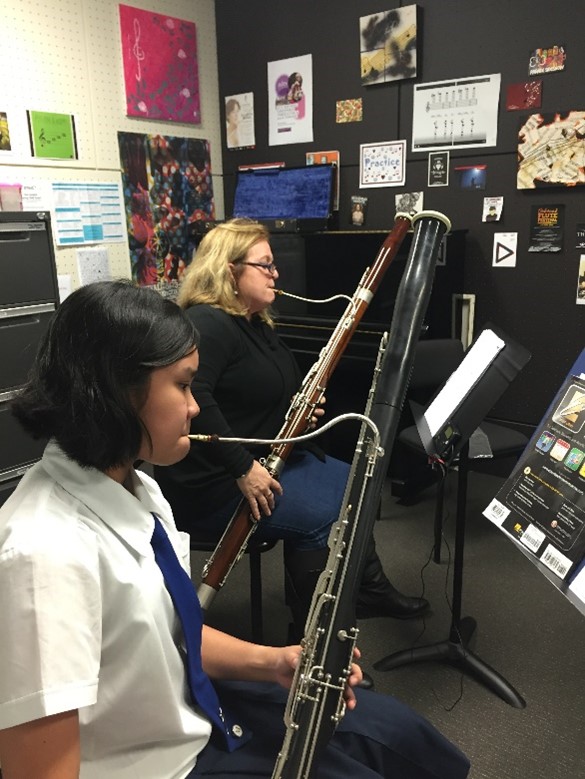
Mrs Anne MacAskill (bassoon, oboe, and flute) with Erin Doan (2021)
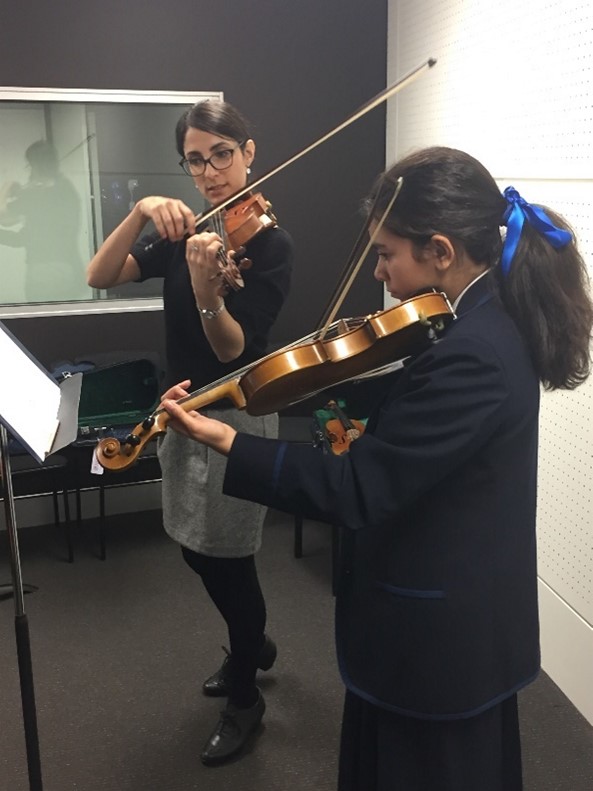
Ms Josie Pollicina (violin) with Siddhi Bhandarker (11W)
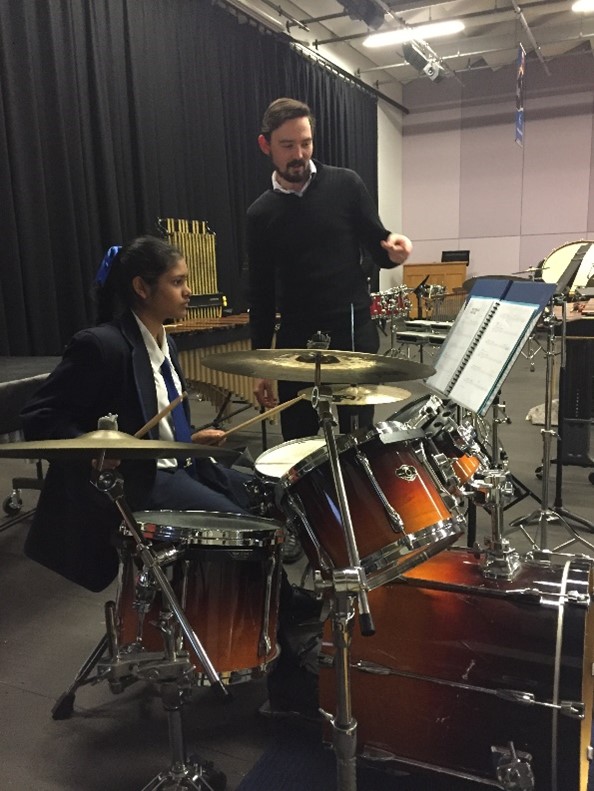
Mr Jacob Cavanough (percussion) in a lesson with Karen Sundar (2019)
MSG News
The Spring Band and String concerts are approaching on 31 October and 8 November respectively. Please consider volunteering some time if your daughter is involved in these concerts—there are many girls to cater for at the BBQ, as well as a parent bar before each concert. MSG committee members will be on hand to assist. To sign up, please visit the appropriate link:
Band—https://volunteersignup.org/WR4FP
Strings—https://volunteersignup.org/C7DPH
Our AGM is approaching on 10 November, and we are looking for a few more people to join our committee for 2023. Being on the MSG committee is a great way for parents to get involved with the Music Department, as we work closely with the staff to assist them in whatever way we can. Your commitment will be two meetings per term, along with representing the MSG at events when you are able to. While most of our committee is continuing next year, we are specifically seeking a Treasurer. This role is not an onerous one, as our accounts are managed by the School. If you are interested in any MSG role, please contact us via email at msgbggs@gmail.com.
As we will be providing wine and cheese at the AGM, please register your attendance at https://events.humanitix.com/bggs-music-support-group-agm.
From the teaching studio
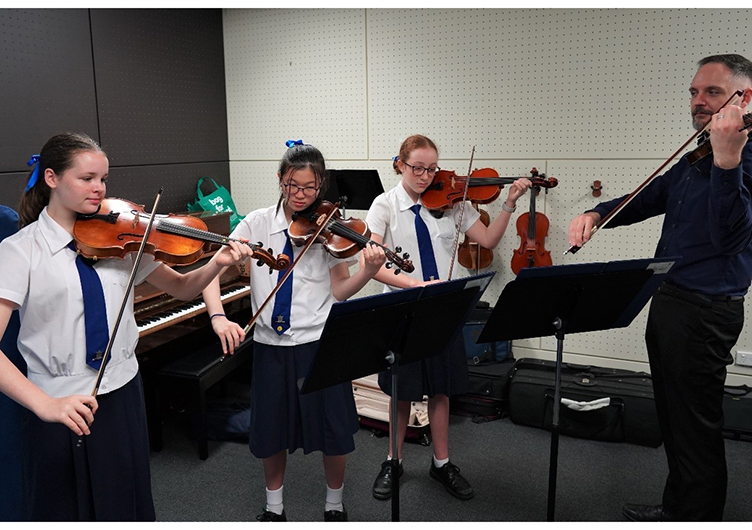
Emily Wille (8R), Erica Shin (8W), and Illy Edwards-Kalaf (8L) warming up for their lesson with Mr Zorzetto
We dropped into Mr Zorzetto’s teaching studio this week to speak with some of our Year 8 Strings students about their year in Instrumental Music and what they enjoy about lessons with Mr Zorzetto and the Instrumental Music Program more broadly.
The violin and viola are both essential and dominant instruments in string and symphony orchestras. What makes the violin or viola special to you and what attracted you to it?
Emily—‘Playing the viola is special to me because although it is a solo instrument, playing in an orchestra really makes you feel like you are part of a team. For example, you must listen to all the other sections/instruments and keep in time with the rest of the ensemble.’
Erica—‘After learning that a violin is the highest string instrument, the violin seemed like a great instrument to play as their bright tone rises above the rest of the string section’.
Illy—‘I think violins and violas carry a lot of the sound from the orchestra as they have higher strings so they are essential. I first wanted to play the violin when I was about nine or 10, I think I was drawn to it because of my primary school.’
How does Mr Zorzetto challenge you in lessons and what do you appreciate about this challenge?
Emily—‘I always appreciate how Mr Zorzetto challenges us in our music lessons. He extends us further from our orchestral rehearsals, by increasing the tempo and by varying the scale ranges. This keeps our lessons exciting and improves our knowledge and our playing skills.’
Erica—‘Mr Zorzetto challenges us in lessons by turning on special cello drones for us to play with scales/pieces. The drone makes it helpful for me to play in tune, and I appreciate this challenge because I believe it is an effective and enjoyable way to develop my ear and improve my intonation’.
Illy—‘Mr Zorzetto makes sure that in lessons we know what we are doing before we increase the speed to make it more difficult.’
For many students to whom we speak, music plays an important role in their lives as a method of expressing themselves, or their feelings, in a unique and purposeful way. Is this something you also do, and, if so, how do you use your talents as a Strings student to achieve this?
Emily—‘I like how versatile music is, specifically playing an instrument. When I play the viola, it enables me to put my own spin or style on a piece and let my personality show through. It lets me have a creative outlet in which I can have a break from regular School life and just focus on the music.’
Erica—‘Playing the violin is an important role in my life as it helps me connect with people. When I play violin with my friends in the Music rooms, I think that it is a fun way to socialise. We might play duet pieces and try our very best to play in tune even if it sometimes doesn’t sound very pleasing to the ear’.
Illy—‘I find playing the violin very calming and when you play it right it makes a nice sound.’
Mr Zorzetto is currently our Acting Coordinator of Strings, and, as a Strings teacher with immense experience, he is well-placed to offer us his reflections on Music tuition within the Instrumental Music Program at BGGS.
You have worked at BGGS as an Instrumental Music Teacher, Ensemble Director, and now Acting Coordinator of Strings across several years. What do you see as unique and special about the Instrumental Music Program here at Grammar that distinguishes it from other programs?
Mr Zorzetto—‘The sheer variety and depth of the musical opportunities and experiences that are available for every student is what makes our Instrumental Music Program a unique and valuable part of our School. It is common for a secondary school to have one junior and one senior string orchestra, but at BGGS we are lucky to have eight different string orchestras and a full symphony orchestra rehearsing weekly and regularly performing each term. This means, that we can place students in an orchestra at their own level and tailor repertoire and concerts to their level. It is an extremely vibrant and exciting faculty of the School.
‘This time of year gives us a unique window into the Instrumental Music Program as we’re just about to hold Term 4 performances and welcome the new 2023 Year 7 students to our School for instrumental placement auditions. Across the next two weeks, we will hear more than 320 String students individually and, after reporting on their progress and achievement for the last time this year, we will be placing all students in new orchestras for 2023. I get a thrill from hearing and seeing how each of our string students have progressed over the year and I especially enjoy the energy and excitement that the new Year 7 students bring.’
The viola has a very interesting tonality and resonance that makes it a special instrument. What effect does this sound have on the string section as a whole?
Mr Zorzetto—’The viola is my favourite instrument, not only because I enjoy playing and listening to its mellow, middle register but because it has such a unique and interesting role to play in every orchestra or ensemble. Yes, you need a main melody (usually violins) and bass line (cellos and double basses) but I have learned that it’s the inner parts that give the music its soul. I’m not alone in thinking this too, famous composers like Beethoven, Haydn, Bach, Mahler, Britten, Dvorak, Hindemith, Schubert, and Mozart, and many more, all played the viola and it shows in their music too; they wrote beautiful melody and harmony lines, as well as amazing soli (instruments of a whole section playing together but as a solo line) just for the viola section. Playing the inner parts in an orchestra also requires an extremely good ear for intonation and sensitivity to orchestral balance to fit in, in between the musical melody lines and bass parts. We are always looking for more violin players who are interested in making the change to viola—it’s a great way to diversify your musical journey and even add an extra challenge.’
In your opinion, what quality/skill/technique/personality trait do you think a student would find most useful when undertaking the study of a strings instrument?
Mr Zorzetto—‘I think the most important personality trait of being a good musician, on any instrument, is the willingness to take on the responsibility of learning an instrument as your own epic quest and then not giving up. All quests need a hero, and you need to be the hero of your own journey; although we rehearse and perform together it’s the individual time spent on home practice that is usually the most crucial aspect of making meaningful progress on your instrument. We all know that practice is important, but, it can sometimes be hard to get into a routine or habit of practice. Personally, I know that I need a goal piece or a live performance to prompt me to practice and I always feel more prepared and accomplished afterwards.
‘In an era when most things are available instantly and where we’re inundated by constantly evolving, new technology, it’s really unique to be playing an instrument that hasn’t changed much since the late 18th century.
‘I will always remember my favourite music teacher saying, “If you want to get better you simply must play your instrument regularly, just thinking about it won’t cut it”. So, start by incorporating your playing into a routine or use it as a break from study. Taking the time to step back, especially at this time of the year, and look back to celebrate what you have learned is essential too.
‘Don’t forget that you can play an instrument and get excellent academic results at the same time! The skills you develop learning an instrument can help you to get great academic results and we are very lucky to have so many shining examples of BGGS students who frequently do. We have a wonderful history of students who have started an instrument in Years 7or 8 and then made their way all the way up to the top orchestras, bands, and choirs, many get selected for leadership roles and some even go on to be awarded Dux of the School.’
Fostering resilience through Music

Developing resilience in our young people has become a hot topic in educational circles and communities more broadly. In Instrumental Music at BGGS, we strive to play a role in helping students work towards developing their own form of resilience to assist their broader preparation for life beyond school.
It is common to initially feel that if you aren’t going to pursue the study of Music beyond school, then why concentrate on, or dedicate time to, Music in the senior years of your secondary education? The answer to that is linked to the understanding that in Instrumental Music, it isn’t necessarily our goal to develop professional musicians—though this is a path you can take to achieve that outcome. Dominantly, we are in fact attempting to add skills beyond an appreciation and love of musical performance. Skills such as time management, teamwork, self-discipline, empathy, determination, and ‘stickability’ or persistence.
It is important to view the time dedicated to Music as an investment in developing the above qualities in our young people—rather than taking their time away from other pursuits. They can quite demonstrably complement each other.
But how are these skills developed when studying or playing Music? An excellent article, with associated links, was published in The Conversation this week that addresses this very topic. You can find the article here.
We hope that your student works towards developing these skills, all the while enjoying the delight associated with creating wonderful music with their Grammar sisters.
Mr Paul Johnston
Assistant Director of Instrumental Music
Looking Ahead
- New Year 7 Auditions—Friday 28 and Saturday 29 October
- Band Spring Concerts—Monday 31 October
- Band Performance Weeks (Auditions)—Week 5 and Week 6
- Strings Spring Concert—Tuesday 8 November
- Music Support Group AGM—Thursday 10 November


